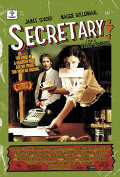
Directed by
Steven Shainberg
104 minutes
Rated MA
Reviewed by
Ruth Williams

Secretary
Synopsis: Lee Holloway (Maggie Gyllenhaal) is a young woman who has had problems fitting into "normal society" from a very young age. We meet her on the day she is released from a psychiatric hospital where she has been in care due to a problem with self-mutilation. She arrives home on the eve of her sister’s wedding, where it quickly becomes apparent that her father’s drinking and the strained relationship this causes between her parents will only drive her right back to her need to feel physical pain. She manages to escape her family when she takes on the role of secretary to E. Edward Grey (James Spader). It isn’t long before they discover an unusual compatibility.Secretary will not appeal to a broad audience. It deals with very touchy issues. The conventional response to people who self-mutilate is to keep them in therapy until they stop doing it. It’s scary that people do such things to themselves, and therefore confronting to watch a character in a film who runs for the nail scissors at the first sign of conflicting feelings. Don’t expect a Movie of the Week look at the subject. If you take into consideration that Blue Velvet was the film that inspired Shainberg to become a director (and for a more overt, it its Lynch's favourite composer Angelo Badalamenti who has scored Shainberg's film), you might have some idea of where the story will take you.
You’d also be right to make assumptions about James Spader being cast as the lawyer. Remember Sex, Lies and Videotape? How about Crash? This around time he plays an obsessive compulsive with sadistic tendencies. On the receiving end of his neuroses is Maggie Gyllenhall as the disturbed girl with masochistic tendencies who comes to believes their relationship is a match made in heaven. Both actors are excellent in their roles. The closest genre category would have to be black comedy. You’re not going to learn anything about how to deal with mental illness. What you will discover is a relationship between a man and a woman that may appear perverse, however, if you are willing to put judgements aside, it’s clear that it works for them, probably more than many so-called normal relationships.
Just as the mainstream has come to embrace, even though sometimes at arm’s length, homosexual love, here we are asked to consider the validity of a sado-masochistic union. The injection of a humorous tone as the relationship between the secretary and the lawyer unfolds, both provides relief to the audience as well as making one feel uneasy that it might not be right to view such issues in a light-hearted manner. In the later part of the film this is perhaps a derailing tendency, particularly the sequence involving Lee's "hunger strike". The sudden switch to the farcical destroys the credibility that had been so cleverly achieved hitherto. The rapid denouement to the happy ending (or are we meant to take the final freeze frame differently) also seems unduly glib.
With all these factors in mind, it’s your call. I enjoyed it, although I felt as if I shouldn’t. The director managed to raise the money in New York, as he didn’t think it was the kind of story the West Coast independents would be willing to finance. It takes all kinds of people and all kinds of films, so whether one approves of the individual outcome or not, it’s reassuring that there are filmmakers out there to keep surprising us and challenging us with these left-of-centre takes on modern life.

Want more about this film?


Want something different?




